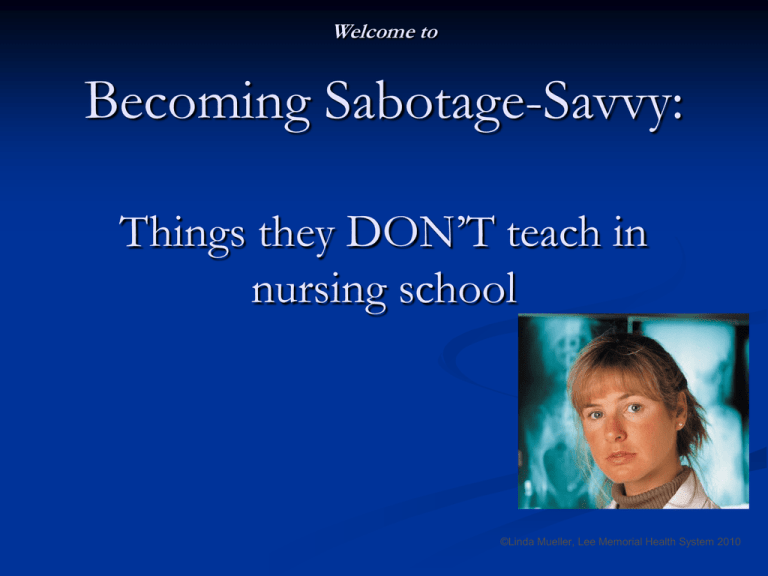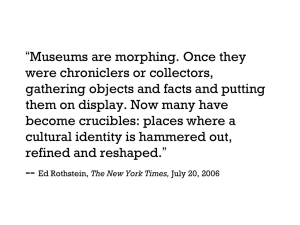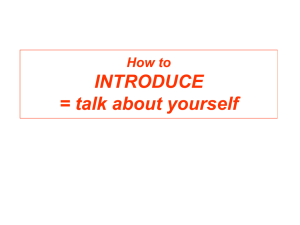Welcome to Ending Nurse to Nurse Hostility
advertisement

Welcome to Becoming Sabotage-Savvy: Things they DON’T teach in nursing school ©Linda Mueller, Lee Memorial Health System 2010 Becoming Sabotage-Savvy ©Linda Mueller, Lee Memorial Health System 2010 2 Becoming Sabotage-Savvy Objectives 1. 2. 3. Define “Horizontal Hostility.” Identify 3 examples of Horizontal Hostility. Practice an effective confrontation technique. ©Linda Mueller, Lee Memorial Health System 2010 3 Becoming Sabotage-Savvy Benefits 1. 2. 3. We’ll know how to behave as professionals. We’ll be sensitive to “Horizontal Hostility.” We’ll feel confident when we confront effectively. ©Linda Mueller, Lee Memorial Health System 2010 4 Becoming Sabotage-Savvy Stages of Group Formation: Form Storm Norm Perform ©Linda Mueller, Lee Memorial Health System 2010 5 Becoming Sabotage-Savvy Exercise: Nurses should… Nurses shouldn’t… ©Linda Mueller, Lee Memorial Health System 2010 6 Becoming Sabotage-Savvy Scientific definition: Stress-induced displacement aggression… OR… …Nurses eating their young. ©Linda Mueller, Lee Memorial Health System 2010 7 Becoming Sabotage-Savvy Definition: A consistent pattern of behavior designed to control, diminish, or devalue a peer (or group) that creates a risk to health and/or safety. -Gerald Farrell, RN, PhD 2005 ©Linda Mueller, Lee Memorial Health System 2010 8 Becoming Sabotage-Savvy Horizontal Hostility: A Demonstration What did Sue do wrong? ©Linda Mueller, Lee Memorial Health System 2010 9 Becoming Sabotage-Savvy “Horizontal Hostility” – what is it? Sabotage Verbal Abuse Bullying ©Linda Mueller, Lee Memorial Health System 2010 10 Becoming Sabotage-Savvy Symptomatic Behaviors: 1. 2. 3. Physical Verbal Emotional ©Linda Mueller, Lee Memorial Health System 2010 11 Becoming Sabotage-Savvy Call it… Horizontal Hostility Lateral violence Colleague abuse Workplace bullying …Same deadly effect ©Linda Mueller, Lee Memorial Health System 2010 12 Becoming Sabotage-Savvy It’s the healthcare culture, silly… ©Linda Mueller, Lee Memorial Health System 2010 13 The BEE Algorithm Appropriate Responses to Stinging Situations ©Linda Mueller, Lee Memorial Health System 2010 Stinging Situations and a Corrective Algorithm The Goal: Eliminate Disruptive or Inappropriate Behavior, to improve performance and outcomes ©Linda Mueller, Lee Memorial Health System 2010 The Solution: Default to the algorithm when Disruptive Behavior occurs. ©Linda Mueller, Lee Memorial Health System 2010 The BEE Algorithm B = Behavior What the person is doing or not doing that is disruptive, inappropriate, or unacceptable. E = Effect Why/how the behavior is disruptive, inappropriate, or unacceptable… how it affects me, hurts my productivity, destabilizes the team or affects customer service. E = Expectation What do you expect the person to do or not do to meet your expectations? ©Linda Mueller, Lee Memorial Health System 2010 17 For Example Your coach snaps her fingers at you to hurry up… Give her a B.E.E. to provide correcting feedback. ©Linda Mueller, Lee Memorial Health System 2010 Example 1 Your coach snaps her fingers at you to hurry up… B: Sue, when you snap your fingers at me to hurry up… E: …it feels demeaning and disrespectful. E: …I need you to give me the same respect you want from me. Can we structure something like this? ©Linda Mueller, Lee Memorial Health System 2010 Another Example Your coach remarks, “I thought you were smart!” Give her a B.E.E. to provide correcting feedback. ©Linda Mueller, Lee Memorial Health System 2010 Example 2 Your coach remarks, “I thought you were smart!” … B: Jane, when you make remarks like that… E: …it offends me and makes me not want to work with you. E: …I need you to stop making such remarks so we can continue to work together. Can we agree on this? ©Linda Mueller, Lee Memorial Health System 2010 Example 3 Your coach asks you to draw blood, a task which you had never done before. She tells you, “It’s now or never!” Give her a B.E.E. to provide correcting feedback. ©Linda Mueller, Lee Memorial Health System 2010 Example 3 When told to draw blood, your coach tells you, “It’s now or never!” … B: Nancy, when you make remarks like that… E: …it makes me feel anxious and unsupported, and not want to do what you ask. E: …I need you to stop making such remarks so I can feel more confident when I learn new skills. Can I count on you? ©Linda Mueller, Lee Memorial Health System 2010 Skills Practice: Your Turn! Use the B.E.E. method to provide correcting feedback. (Use the case studies provided.) ©Linda Mueller, Lee Memorial Health System 2010 The BEE Algorithm Describe the specific behavior that was unacceptable. Describe why the behavior was unacceptable (the effect or impact). Collaborate on or suggest a better way. Request their cooperation. ©Linda Mueller, Lee Memorial Health System 2010 25 Becoming Sabotage-Savvy If it happens to you: Don’t blame yourself Speak up! Confront the aggressor Keep detailed records Make a formal written complaint ©Linda Mueller, Lee Memorial Health System 2010 26 Becoming Sabotage-Savvy Action Planning… ©Linda Mueller, Lee Memorial Health System 2010 27 Becoming Sabotage-Savvy “Somebody has to do something, and it’s incredibly pathetic that the somebody is us.” -Jerry Garcia Grateful Dead Our Response: There’s nobody better than us! ©Linda Mueller, Lee Memorial Health System 2010 28 Becoming Sabotage Savvy References: Ending Nurse to Nurse Hostility: Why Nurses Eat Their Young And Each Other --Kathleen Bartholomew, RN, MN Zapping Conflict in the Health Care Workplace --Judith Briles, PhD Crucial Confrontations: Tools for Resolving Broken Promises, Violated Expectations, and Bad Behavior --Patterson, Grenny, McMillan, & Switzler “Developmental sequence in small groups,” Psychological Bulletin --Bruce Tuckman, Ph.D. Coaching for Results --Berry, Cadwell & Fehrmann “Aggression in clinical settings: Nurses’ views,” Journal of Advanced Nursing --Gerald A. Farrell, RN, PhD ©Linda Mueller, Lee Memorial Health System 2010 29 Becoming Sabotage-Savvy Evaluations, please: All feedback is positive What went well What should be changed next time Suggestions for making the course better ©Linda Mueller, Lee Memorial Health System 2010 30







